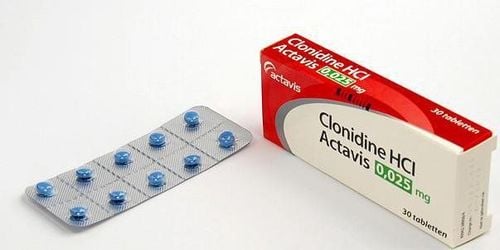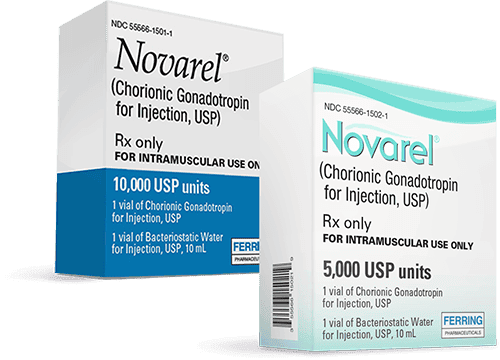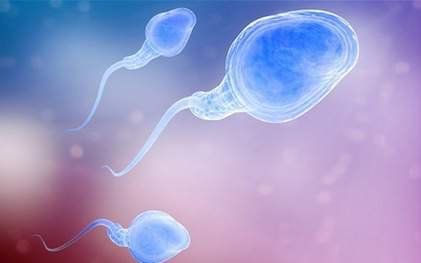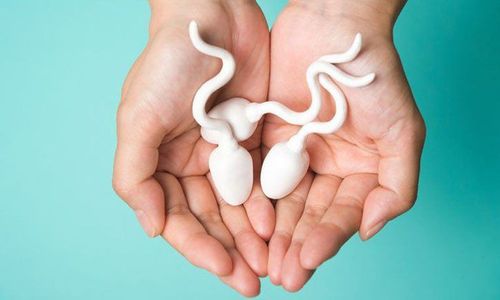This is an automatically translated article.
Normal semen is a thick, white liquid, however can vary in color and consistency. Dilute semen can occur due to low sperm count, lifestyle factors, and nutritional deficiencies. So does dilute semen affect fertility or not?
1. Why is semen diluted?
Semen is the fluid secreted out of a man's penis when he ejaculates. Semen contains sperm and fluid secreted by the prostate gland and other male reproductive organs. Normally, semen is a thick and white liquid, however, some causes can change the color and consistency of semen.Dilute semen can be a sign of a low sperm count, indicating a fertility problem. Clear semen can also be a temporary condition that doesn't cause serious health problems. There are several common causes of dilute semen. Most are treatable or preventable.
1.1. Diluted semen due to low sperm count Low sperm count is one of the most common causes of dilute semen. The World Health Organization (WHO) defines a low sperm count (oligospermia) if there are less than 15 million sperm per milliliter of semen. A low sperm count can make it harder for a person to conceive, but it doesn't mean he or she is infertile.
Low sperm count is not always possible to identify a clear cause. However, some genetic conditions, such as Klinefelter syndrome, can affect a person's sperm count.
Other causes of low sperm count include:
Varicocele is a dilation of the veins that run from the testicles to the scrotum. Varicose veins usually have no symptoms, but they can reduce sperm production and reduce semen quality in some people. The varicocele may be dilated in one or both testicles. Varicocele is so common, it affects about 15% of men and about 40% of men screened for fertility problems have the condition. That said, about 80% of those People with varicocele do not have any fertility problems. Hormonal disorders such as hyperthyroidism and hypogonadism. Hormones produced in the pituitary gland, the hypothalamus, and in the testes are all necessary to produce a healthy sperm count. Changes in any of these hormones can affect sperm production. Infections: Genital infections including sexually transmitted diseases such as gonorrhea or epididymitis can cause low sperm counts. Exposure to radiation or toxins such as industrial chemicals, herbicides, and lead. Drug use Drinking too much alcohol Tobacco use Being overweight or obese Certain medications Tumors: Benign or malignant tumors in the testicles can affect sperm production. Other potential causes of low sperm count include:
Ejaculation problems, including retrograde ejaculation. Your immune system has anti-sperm antibodies. Injury or other problems in the sperm ducts.
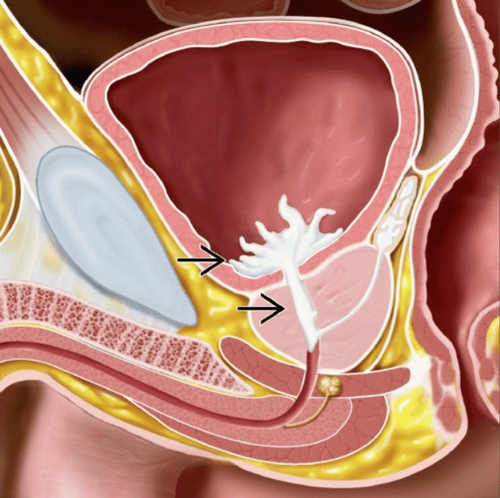
Tình trạng xuất tinh ngược dòng có thể khiến số lượng tinh trùng thấp
1.2. Frequent ejaculation can make semen dilute A person who ejaculates frequently can lead to dilute semen. If a person regularly masturbates or engages in sexual activity several times a day, their body may not have enough time to produce enough quantity and quality of semen as usual.
In a 2016 study, researchers tracked 20 men's daily ejaculation schedule for 14 days after 3-5 days of abstinence. They collected and analyzed semen samples from these men on days 1, 3 and 14.
The researchers found that both semen volume and sperm count decreased over the time period. from day 1 to day 3 and back to normal from day 7 to day 14.
1.3. Dilute semen can be caused by retrograde ejaculation Normally, during ejaculation, semen passes through the urethra and out of the penis. However, a disorder in your bladder sphincter can cause semen to travel back into your bladder, leading to a condition called retrograde ejaculation.
People with retrograde ejaculation may produce less semen or the semen may appear thin or fluid.
1.4. Zinc is an important nutrient that supports many essential functions of the body, such as DNA synthesis, fighting infection, wound healing and reproduction.
Zinc also plays a role in the production of healthy sperm. According to a 2018 review published in the Journal of Reproduction and Infertility, zinc deficiency can contribute to poor semen quality and infertility. However, having too much zinc in the body can also reduce sperm quality.
Our bodies cannot produce or store zinc, which means you can only get it from foods. Some food sources of zinc include:
Oysters Red meats, poultry and shellfish Nuts, seeds and whole grains Beans Dairy products like yogurt,...

Nam giới có thể bổ sung một số thực phẩm giàu kẽm như hàu
2. Does dilute semen affect fertility?
Diluted semen is usually temporary and may go away on its own. Rapidly liquefying semen can sometimes indicate a low sperm count or another condition that can affect fertility.
Having a low sperm count does not mean a person is infertile, but it can make conceiving more difficult. Dilute semen is also caused by lifestyle factors, nutrient deficiencies, or pre-existing medical conditions.
According to the National Institute of Child Health and Human Development, USA, most male fertility problems occur due to problems that affect the way sperm function.
3. What does discolored semen mean?
Semen of a color other than white, which can sometimes indicate a health problem. Pink, red, or brown semen may be due to bleeding from an inflamed prostate gland or swollen seminal vesicles.
Other causes of blood in semen include:
High blood pressure Sexually transmitted diseases Prostate infections Prostate, testicular or urethral cancer Yellow semen can be urine retention or an excessive amount of white blood cells occurs in a condition called leukocytosis.
Green semen may indicate an infection in the prostate or other reproductive organs.
4. Diluted semen, when to see a doctor?
People with persistent dilute semen or discolored semen should talk to their doctor or urologist. In addition, a person should be examined if dilute or discolored semen occurs with any of the following symptoms:Abnormal ejaculation Difficult or painful urination Pain or discomfort in the testicles Pain in the lower abdomen or lower back Fever Chills cold Nausea

Một số trường hợp, nam giới có thể gặp tình trạng buồn nôn khi tinh dịch loãng
To diagnose the cause of dilute or discolored semen, your doctor will ask about your symptoms, medical history, and lifestyle habits. If necessary, the doctor can also perform a physical exam. Your doctor may also order a semen sample to be analyzed for:
Amount and consistency of semen pH Number of sperms Sperm motility or speed of sperm movement Size and shape form of sperm
5. Treatment of dilute semen
Treatment options for dilute or discolored semen will depend on what is causing the condition. Semen can liquefy faster or be thinner than usual if someone masturbates or engages in sexual activity multiple times per day. In this case, abstaining from sexual activity for a few days can help treat the problem.
If your doctor determines that the cause is a bacterial infection, he or she will prescribe antibiotics for you. For people with hormonal imbalances, their doctor may recommend hormone therapy.
For varicose veins, the doctor will apply one of the following treatments:
Laparoscopic surgery: the surgeon will insert a laparoscope through a small incision into the abdomen . The varicose vein will then be located and repaired. Percutaneous embolization: this is a minimally invasive procedure in which the surgeon inserts a coil or balloon into the dilated vein. Next, enlarge the coil or balloon to restore normal blood flow in the testicle. Some lifestyle changes that can help improve semen quality may include:
Maintain a healthy body weight Reduce stress Get enough sleep Quit smoking Reduce alcohol intake

Bỏ thuốc lá và thay đổi lối sống có thể giúp cải thiện chất lượng tinh dịch
Dilute semen is usually a temporary condition and may resolve on its own. But it can sometimes indicate that a person has a low sperm count or reduced semen quality. These can be the result of certain medical conditions and lifestyle factors. Dilute semen does not mean that the person is infertile. However, people with persistent dilute semen can consult a doctor.
To examine and treat the condition of dilute sperm, patients can go to the Department of Andrology - Vinmec International General Hospital to be directly examined by specialized doctors.
Andrology specialty has the function and task of specializing in examination, treatment as well as early detection of health problems related to male genital organs, physiological diseases, reproductive functions and diseases. sexually transmitted. Including common diseases: Infertility, balanitis, cystitis, urethritis, foreskin length, foreskin stenosis,...
All examination and treatment procedures are always performed. performed by a team of qualified doctors, combined with modern equipment. Besides, the polite and civilized examination space brings comfort to customers.
Please dial HOTLINE for more information or register for an appointment HERE. Download MyVinmec app to make appointments faster and to manage your bookings easily.
Reference source: medicalnewstoday.com - healthline.com




